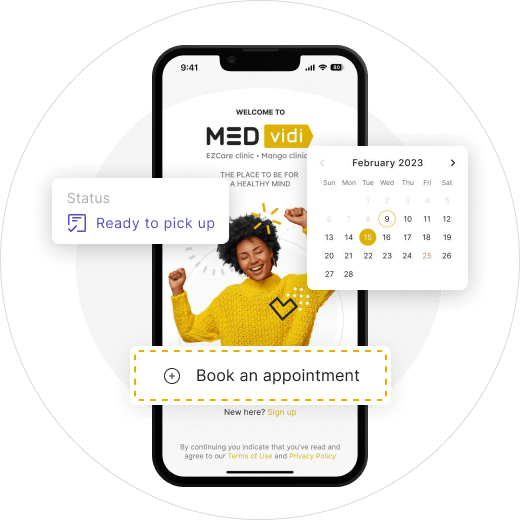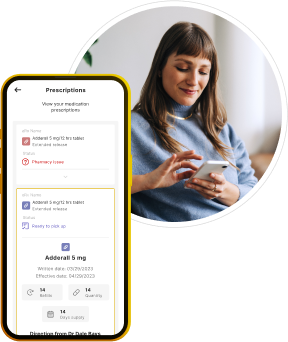Online ADHD Treatment and Medication Prescription
Experienced medical practitioners
Convenient appointment times
Online prescriptions

Why Choose MEDvidi
-
Trusted medical teamOur licenced medical providers are experienced in diagnosing and treating ADHD
-
AffordabilityAccess cost-effective online ADHD management services and save on travel.
-
Evidence-based treatmentsLearn more about science-backed solutions and receive a personalized plan.
-
Online medication managementIf deemed necessary, a healthcare provider will prescribe ADHD medication online.
-
24/7 supportOur Care Team is always here to answer your questions.
Our licenced medical providers are experienced in diagnosing and treating ADHD
Access cost-effective online ADHD management services and save on travel.
Learn more about science-backed solutions and receive a personalized plan.
If deemed necessary, a healthcare provider will prescribe ADHD medication online.
Our Care Team is always here to answer your questions.
How We Work
Sign up, fill out the basic information, and choose the most suitable date and time for your initial online appointment.
See a healthcare provider to go through a detailed ADHD assessment online.
Discuss your treatment goals and receive a personalized plan to achieve them. Obtain an online prescription for ADHD medication if required.
Follow-ups
See a healthcare provider regularly to monitor your results and concerns or adjust the treatment plan.
Pricing
Initial appointment
- An online 30-minute visit
- ADHD assessment
- Identifying treatment goals
- Developing a treatment plan
- Prescribing medications if required
Follow-ups
- Regular 15-minute visits
- Symptoms monitoring
- Recommendations on coping techniques, lifestyle, and thinking and behavioral changes
See One of Our Experienced Providers





All-in-one Personal Portal
- Easy scheduling: Schedule a visit from your couch, any time, no waiting in line!
- Comprehensive visit management: Reschedule your appointment in a few clicks.
- Plan in advance: No forgetting to schedule that follow-up next month!
- Track your prescription online: Check your prescription status anytime and know when the medication is ready to pick up.
- Switch pharmacies: Your chosen pharmacy doesn't have your medication? Select another one in a minute.
- Save personal details: No need to repeatedly fill out personal and medical information. Just choose a date and time to book a visit.

Online ADHD Treatment
Treatment Plan for Adult ADHD
Stimulant and non-stimulant medications are usually used as a fast-acting impulse control treatment to help eliminate symptoms.
Therapy
Psychotherapy is focused on long-term behavioral changes. They are expected to last even after stopping taking medicines.
Lifestyle modifications
Both medication and non-medication methods are complemented with self-help tips, so the patients can cope with the symptoms themselves.
Prescription Management
Medication management for ADHD brings the expected results in about 70-80% of cases. They help reduce moderate and severe symptoms that affect your daily life.
When choosing a proper medication for ADHD, healthcare providers first decide on the stimulant or non-stimulant treatment.
Stimulants are fast-acting. Their impact is noticed within 30 minutes* to a few hours.
The most common stimulant medications are:
Non-stimulants require a longer period to show their effects. They are usually used if a person experiences side effects from stimulants or has an addiction history.
The most common non-stimulants for ADHD are:
How Do ADHD Medications Work?
Although medications can’t make the person obtain new habits, they improve brain functioning and create a strong foundation for behavioral changes.
Advantages of Online Prescriptions

- Fewer errors in medication names and dosages
- Easily accessible prescription history
- Shorter wait times
- No need to visit a walk-in clinic every month
- Smooth workflow, as online prescriptions may be delivered directly to pharmacies
| MEDvidi | Traditional Clinics | |
|---|---|---|
| Cost of an initial visit | $195 | $400-500 |
| Appointments within 24 hours | ||
| Booking or rescheduling visits in a minute | ||
| Saving time on travel | ||
| Video appointments from home or any location | ||
| Online prescriptions sent to your pharmacy | ||
| Fast and caring responses from the Care Team |
Hear from what thousands of patients say
What Is ADHD?

ADD vs. ADHD: What is the Difference?
Common Symptoms of ADHD
- Difficulty focusing on tasks and completing them
- Quick distraction by low-priority activities
- Reduced attention to detail
- Forgetfulness and tendency to lose things
- Procrastination and poor prioritization
- Reluctance to engage in mentally challenging tasks
- Carelessness
- Excessive fidgeting
- Inability to remain still for long periods
- Switching between different tasks without finishing them
- Hyper-focusing and losing track of time
- Restlessness
- Impulsive behaviors
- High impatience and excessive talking
- Frequent mood swings
- Inability to cope with stress

These are major symptoms of ADHD. During the assessment for ADHD diagnosis, you will fill out more detailed checklists.
As part of the initial evaluation, your healthcare provider will rule out other mental health conditions. ADHD has a low chance of developing in adulthood, and its symptoms may mask or co-exist with:
Wondering if it is ADHD or something else? Take our free test to examine your symptoms in more detail.
Causes of Adult ADHD
The exact causes of adult ADHD are not fully understood. Research suggests that a combination of genetic, neurobiological, and environmental factors may contribute to its development.
ADHD tends to run in families, indicating a genetic component. The disorder may impact specific genes involved in regulating neurotransmitters and brain development. Studies have shown that individuals with a family history of ADHD are more likely to develop it.
Prenatal exposure to tobacco smoke, alcohol, or drugs, premature birth, low birth weight, and maternal stress during pregnancy have been associated with an increased risk of ADHD. Lead exposure and certain prenatal and early childhood environmental toxins may also play a role.
ADHD is associated with differences in brain structure and functioning. It can affect neurotransmitters, such as dopamine and norepinephrine, which play a role in regulating attention, impulse control, and executive functions. Structural and functional differences in the prefrontal cortex and basal ganglia have also been observed.
Frequently Asked Questions
Can I see a healthcare provider at MEDvidi if I already have a diagnosis?
Yes, whether you already have a diagnosis or just have started to notice ADHD symptoms recently, our medical team is ready to help. You can discuss your expectations and treatment goals during the initial appointment. A healthcare provider may create a new treatment plan for you, help maintain the one you have, or adjust your treatment in the case of any concerns.
What is the best treatment for ADHD—medications or therapy?
Each of our patients gets a personalized strategy because there is no one-size-fits-all in ADHD treatment. Medications help reduce symptoms that cause the most discomfort relatively fast. Psychotherapy, on the other hand, becomes effective with time, but its results are long-term. The most effective plans for ADHD combine both medications and therapy as well as self-help lifestyle changes.
Can healthcare professionals treat ADHD online?
Yes, licensed healthcare providers can diagnose and treat ADHD online since they follow the same standard guidelines. You should have a real-time video appointment to go through an assessment and receive a treatment plan.
Can I use insurance at MEDvidi?
Currently, MEDvidi doesn’t accept insurance. We are actively working on collaborating with several insurers and will promptly notify our patients when such partnerships are established.
What if I don't treat my ADHD?
If undiagnosed or untreated, ADHD may cause difficulties in different spheres of life. These may be troubles in relationships, job search, handling deadlines, and communicating with colleagues and friends. There also may be a higher risk of addictions and the development of other conditions, such as depression and anxiety.
What are the differences between stimulant and non-stimulant ADHD medications?
Stimulant and non-stimulant ADHD meds primarily differ in their mechanisms of action and the speed of onset and offset. Other differences are related to side effects, abuse potential, and more
Can I get ADHD medications over the counter without a prescription?
Both stimulant and non-stimulant medications for ADHD are classified as prescription drugs in the United States. These medications have potentially severe side effects and require careful monitoring and dosage adjustments by a healthcare professional.
How much do ADHD medications cost?
The cost of ADHD medications can vary depending on the specific medication prescribed, dosage, formulation (generic or brand name), insurance coverage, and location.
Can I get ADHD medication online?
Healthcare providers at MEDvidi are licensed to prescribe ADHD medications, including controlled substances, online.
Who can prescribe ADHD medications?
Only licensed healthcare professionals can prescribe stimulant and non-stimulant ADHD medications:
- Medical Doctors (MDs)
- Doctors of Osteopathic Medicine (DOs)
- Psychiatrists
- Primary care physicians
- Neurologists
- Family physicians
The list of medical practitioners licensed to prescribe ADHD medications may vary by state due to specific regulations.
What are the side effects of ADHD medications?
Potential side effects differ for each medication depending on its active ingredients, mechanism of action, drug class, dosage, and other factors. Some common side effects of stimulant and non-stimulant medications for ADHD include insomnia, headache, dry mouth, irritability, decreased appetite, etc. Discuss the side effects of the prescribed medication with your healthcare provider, follow the instructions, and report any severe or prolonged side effects to adjust your treatment.

